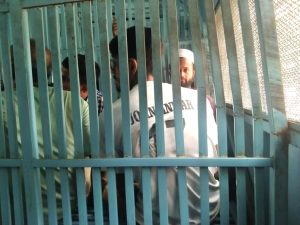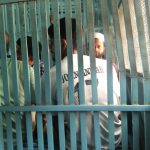NEW DELHI (Morning Star News) – Relatives of ethnic Rohingya Christian refugees cast into the sea by India’s navy have yet to hear from them nearly two months after the cast-offs swam ashore to their native Myanmar (Burma).
“If someone could just tell us if they are alive or dead – this anxiety is killing us,” Sadeq Shalom told Morning Star News in Delhi.
Refugees from Myanmar themselves, the relatives of the cast-offs have been hunted by Delhi police since Indian authorities deported 38 Rohingya, including 15 Christians, on May 6.
Police had detained the Rohingya Christian refugees from the Uttam Nagar and Vikaspuri areas in Delhi while authorities rounded up the 23 Muslim Rohingya from other parts of Delhi. The deported Rohingya who were abandoned in international waters had to swim to Myanmar – the country they had left to escape genocide in the first place.
“Authorities gave neither them nor their families any prior notice or information,” said Nasir David, whose elderly parents have been deported.
Shalom said the 15 deported Christians have families left behind in India. Police picked up and deported Shalom’s older brother, John Anwar, on May 6. He was one of the 15 Christians, five women and 10 men including three elderly persons, that naval personnel forced into the sea in the early hours of May 9.
Anwar’s wife, who had suffered a miscarriage in April, was also among the 15 Christians deported.
“My sister-in-law was not only dealing with her emotional and mental health challenges but was also in the process of physically recovering from the miscarriage,” said Shalom, adding that there was another deported woman who had undergone miscarriage.
David said authorities deported the elderly without their daily medicines and without money to purchase them.
“My mother is a diabetic and my father is on blood pressure medication – both need their daily dosage of medicines,” David told Morning Star News. “My mother faints due to sugar fluctuation, and it scares me to death wondering how they are surviving in Myanmar without money, medicines and food.”
Several of the cast-offs did not know how to swim, including David’s parents, he said.
Shalom told Morning Star News the ordeal began on Feb. 26, when authorities called roughly 150 Christian Rohingya for their “biometrics,” such as fingerprints and other physical measurements used for identification. Authorities then released them without incident, but on May 6 police informed them that there was a technical failure in the biometric processes of 15 people, and that they needed to redo them.
Police moved them from one place to another in efforts to register their biometrics, failing each time due to internet connectivity issues, said Shalom. During this time, officials forced women to undergo pregnancy tests and men underwent identification mark tests. Officials finally took them to the Inderlok Detention Centre where authorities confiscated their phones.
“Until then we were receiving occasional updates from our families through messages about their whereabouts, but after their phones were snatched, we did not know where they were,” said Shalom.
The next day, Shalom received a phone call from an unknown number, which turned out to be his brother Anwar. He hastily informed Shalom that authorities were taking them to the airport to deport them to Myanmar.
“It was a 17-seconds call that shook us completely,” said Shalom.
Three days later, May 9, Shalom again heard from his brother Anwar at 5:30 a.m.; having swum ashore to Myanmar, he had borrowed a phone from a fisherman to call Shalom.
“Anwar narrated the horrifying journey and the plight they all had to go through,” said Shalom. “Hearing that, we were all completely shaken.”
The Indian military had transported the Rohingya via aircraft to Sri Vijaya Puram (also called Port Blair) in the Andaman and Nicobar Islands. Once there, officials seized their U.N refugee documentation, money and belongings before placing them on Indian Navy ships, according to Anwar and media reports.
Navy personnel bound their hands and covered their eyes with blindfolds, Anwar told his brother.
“They were bound tight for about four hours, causing Anwar’s wrists to bleed,” Shalom said.
Anwar also told him how he was assaulted after naval personnel noticed a cross and Anwar’s full name “John Anwar” written on his T-shirt. They asked him how many of them were Christian, and he revealed their number.
The naval personnel accused them of being a part of the “Pahalgam terror attack” that took place in Jammu and Kashmir on April 22, inexplicably labelling them, “Pakistani.”
The naval crew then presented the group with two options: return to Myanmar or transfer to Indonesia. Fearing repatriation to Myanmar, the refugees selected Indonesia as their destination. After midnight of May 8, the naval personnel removed their restraints, distributed life jackets to them and told them to jump into the sea.
“They were asked to stay in the water and assured that someone would get there to rescue them,” David said.
After treading water for some time, no one arrived, so they decided to try to swim ashore.
“Those who knew how to swim dragged those who could not swim,” David said.
Upon reaching shore, they saw some men and, “thinking they might get killed for trespassing international border, they quickly walked closer in a surrendering posture,” David said. As the cast-offs drew closer, they realized those on shore were fishermen.
“It was a shock to all those who reached the shore that they were not in Indonesia but back in Myanmar,” Shalom said.
The account came in the first and the last call Shalom received from Anwar, who confirmed that they “landed alive in Myanmar.”
David said he also got to speak to his parents, but that was the last that he heard from them.
“To this day, we do not know about their well-being, their safety or even if they are still alive,” David said, clearly anxious.
Faith amid Uncertainties
David shared his fear and concern for his family and community with Morning Star News.
“As a son, I feel like a human without life, torn apart by grief, and as the representative of my community, I am burdened and deeply concerned for the safety and future of our people, for we live in constant fear,” he said.
Parents whose children have been deported are not able to console themselves, Shalom said.
“They have been repeatedly saying, ‘If we could get news about our children – whether they are alive or dead, but we don’t know how they are,’” he said.
David said only his faith in God enables him to endure each day. He requested prayer for them as well as for India.
“We believe that God is sovereign and trust that He watches over His children even in the darkest valleys,” he said.
They are moving from place to place, waiting upon God to make a way for them to get political asylum in a country where they could “live without any fear.”
“We appeal to all the churches, Christian organizations and people of goodwill to stand with us in prayer, and extend all possible help – financial, speaking to embassies on our behalf and governments for our relocation,” Shalom said.
Despite despairing circumstances, David continues to keep his hope alive.
“Though I may never see my parents again in this life, I hold on to the eternal hope that we will meet again in heaven – in the arms of our Savior, where every tear will be wiped away and sorrow will be no more.”
Inhumane Deportations
Besides the 135 Christian Rohingya questioning the inhuman way of deportation at the hands of the government, Amnesty International, a global human rights organization on June 19 urged the Indian government to “halt all deportation.”
It urged the Indian government to “uphold its legal obligations under international law and halt all deportations of Rohingya refugees at once,” said Aakar Patel, chair of the board of Amnesty International India in its statement.
Shalom along with 150 Rohingya Christians came to India in 2014 after they faced brutality at the hands of Myanmar military. Upon arriving in Delhi, the government of India granted many of them Long Term Visas (LTV) and they also registered with the United Nation High Commissioner for Refugees (UNHCR).
Shalom and the other children went rag picking for their survival, while their parents did menial jobs. Rag picking throughout the day, the children attended evening tuition and slowly and gradually passed their grade 10 and 12 examinations through the open school system.
With education, these rag pickers acquired decent jobs. David’s father, who was uneducated, learned to read Bengali and Rohingya in order to read the Bible and teach others. He began to lead church services and became a church deacon in 2006, said David.
But in 2017, the government of India announced the Rohingya as illegal immigrants and cancelled all their visas.
“It was only now after several years of struggle that we had started to feel settled, and now suddenly we are homeless, without jobs, without food, uprooted, nowhere to fall back,” David said.
Shalom said they are not afraid of deportation, but “we have problems with the way we are being deported – picked up without prior notice, separated from our families, assaulted on the way and thrown in the international waters to die. We would request that they deport us all together and not separate us from our families.”
Myanmar regards the Rohingya as migrants from Bangladesh and denies them citizenship, but the Rohingya maintain they are indigenous to western Myanmar. Before the Rohingya genocide in 2017 that led to more than 740,000 Rohingya fleeing to Bangladesh, their population in Myanmar was estimated at 1.4 million.
Authorities in Myanmar impose restrictions on their movement and access to state education and civil service jobs.
U.N. officials and Human Rights Watch have described Myanmar’s persecution of the Rohingya as ethnic cleansing. U.N. investigations have found evidence of increasing incitement of hatred and religious intolerance by ultra-nationalist Buddhists against Rohingyas, and Myanmar security forces have subjected them to summary executions, disappearances, arbitrary arrests and detentions, torture and ill-treatment and forced labor against the community.
Rohingya refugees in India face persecution and attacks from Hindu nationalist groups.
Christian support organization Open Doors ranks India 11th on its 2025 World Watch List of countries where Christians face the most severe persecution. India stood at 31st place in 2013 but has steadily fallen in the rankings since Narendra Modi came to power as prime minister.
Religious rights advocates point to the hostile tone of the National Democratic Alliance government, led by the Hindu nationalist Bharatiya Janata Party, which they say has emboldened Hindu extremists in India since Modi took power in May 2014.
If you would like to help persecuted Christians, visit https://morningstarnews.org/resources/aid-agencies/ for a list of organizations that can orient you on how to get involved.
If you or your organization would like to help enable Morning Star News to continue raising awareness of persecuted Christians worldwide with original-content reporting, please consider collaborating at https://morningstarnews.org/donate/?
###
© 2025 Morning Star News. Articles/photos may be reprinted with credit to Morning Star News. https://morningstarnews.org
Tweet: https://twitter.com/morningstarnewz/
Facebook: https://www.facebook.com/MorningStarNews
Morning Star News is a 501(c)(3) non-profit corporation that relies solely on contributions to offer original news reports of persecuted Christians. By providing reliable news on the suffering church, Morning Star News’ mission is to empower those in the free world to help and to encourage persecuted Christians that they are not forgotten or alone. For free subscription, contact [email protected]; to make tax-deductible donations, visit https://morningstarnews.org/donate/? or send check to Morning Star News, 34281 Doheny Park Rd., # 7022, Capistrano Beach, CA 92624, USA.
- Rohingya Christian refugee John Anwar was detained on May 6, 2025. (Morning Star News)



Speak Your Mind